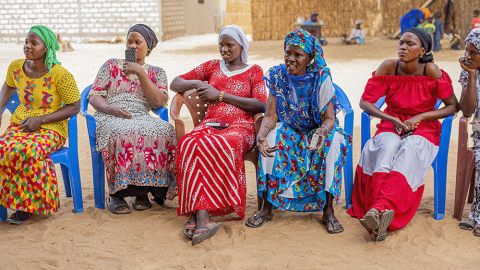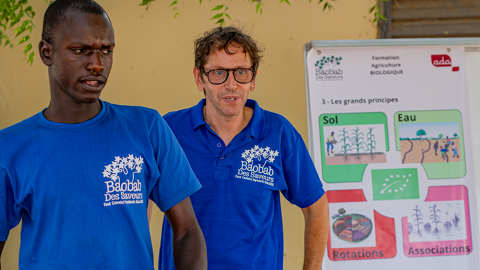
Young People and Green Jobs: a new programme for a greener, more inclusive economy

Faced with the twin challenges of the ecological transition and chronic youth unemployment in Africa, ADA is launching the Young People and Green Jobs programme. This innovative initiative that focuses on local small and medium-sized enterprises (SMEs) with a view to structuring sustainable value chains, while creating employment opportunities for young people under the age of 35.
This programme is based on an insight gained from ADA's past experience: to seize the economic opportunities created by the green transition, the programme needs to be targeted at solid SMEs that are already established in their markets and that are keen to improve their environmental performance, while at the same time strengthening micro-entrepreneurs located upstream or downstream in their value chain.
This is why ADA is adopting a two-pronged approach: supporting SMEs in their ecological transition and helping micro-entrepreneurs to become reliable partners of these SMEs and benefit from the economic opportunities offered by the green transition.
Targeting high-potential companies
The programme targets mature SMEs, in existence for at least five years, with a viable business model, a structured accounting system and real potential for growth and job creation for young people. These companies receive tailor-made support aimed at improving their eco-efficiency and providing them with access to new, responsible markets and green financing. This support seeks to make the ecological transition a genuine lever for competitiveness and job creation.

At the same time, ADA works with micro-enterprises, particularly those run by, or involving, young people. The support takes the form of technical training, entrepreneurial coaching and easier access to finance. The aim is to prepare these businesses to meet the requirements of partner SMEs, so that they can become part of local value chains over the long term.
Baobab des Saveurs: the first SME supported by ADA
The example of Baobab des Saveurs, an SME committed to promoting local plants, is a good illustration of ADA’s approach.
The company obtains its supplies from women's groups, some of whom will improve their organisational and entrepreneurial skills thanks to the programme. The programme also includes financial education to promote financial inclusion. The groups will also be trained in the production and processing of organic bissap and will be supported in acquiring appropriate equipment.


At the same time, ADA will help the SME to reduce its environmental impact, in collaboration with the Bureau de mise à niveau, a government agency with experience in implementing similar projects.
Outlook
Ultimately, the programme aims to generate concrete results: an increase in the number of direct and indirect jobs, an improvement in the revenue of the SMEs supported by the programme and an increase in the skills of the micro-entrepreneurs integrated into these value chains. ADA’s goal is to demonstrate that the green transition, far from being a constraint, can become a driver of economic inclusion, provided that ambitious SMEs and motivated micro-entrepreneurs are connected into sustainable value chains. ADA has recently launched two new projects with Senegalese SMEs Proxy E-mobility, which specialises in green mobility, and COSENA, which is active in local agri-food processing.